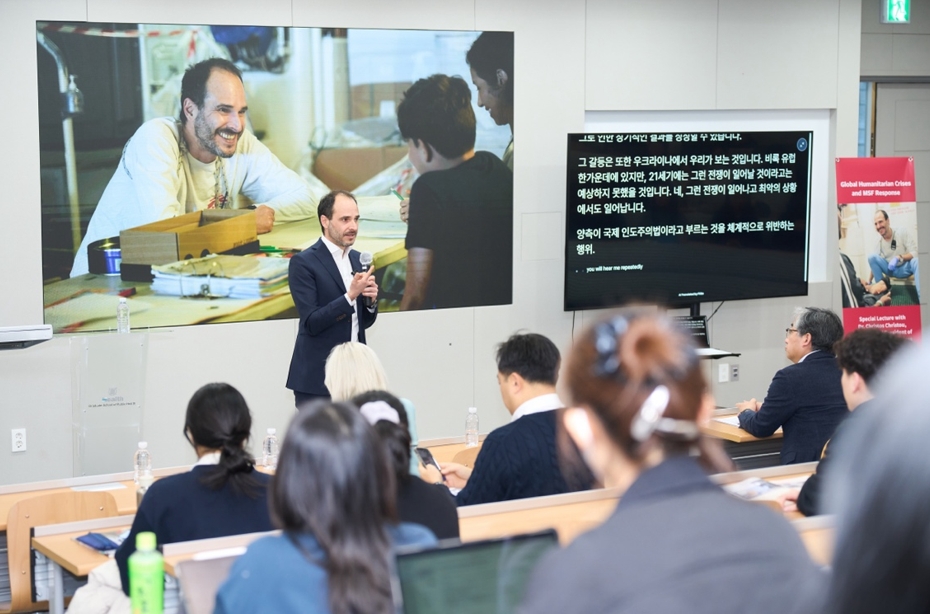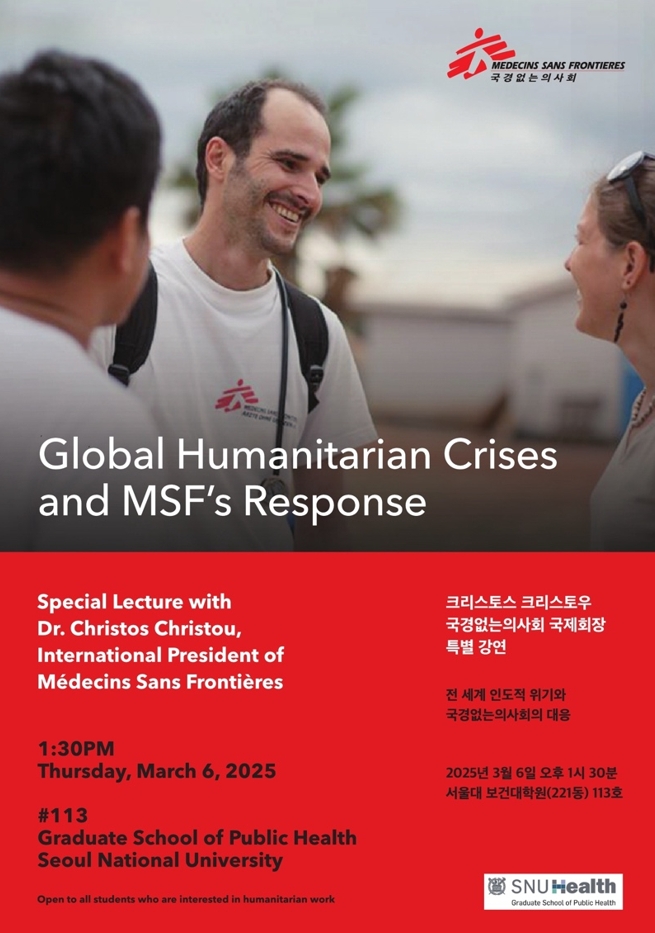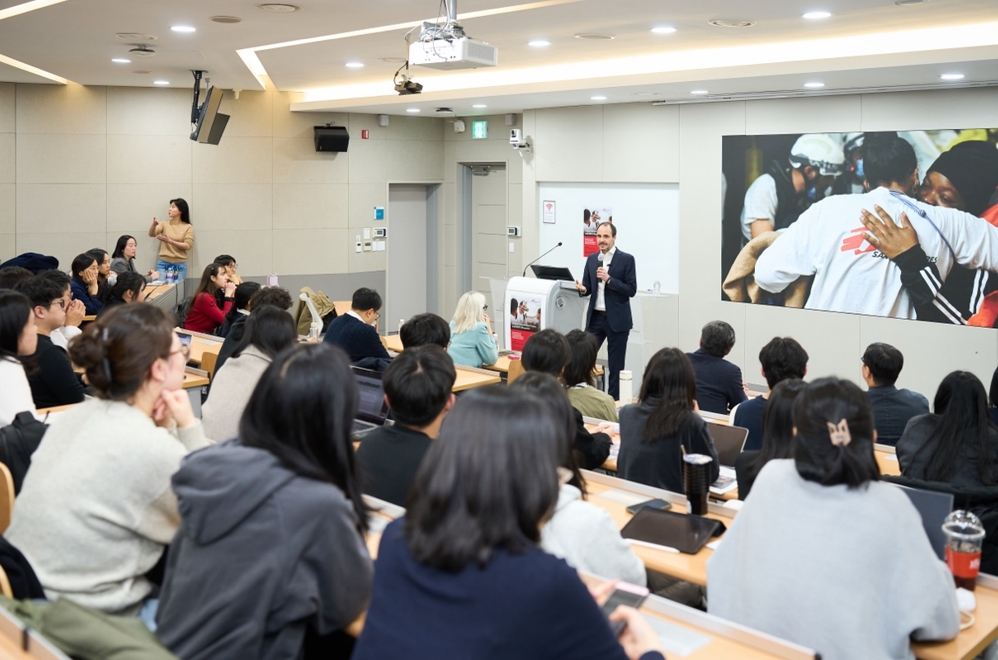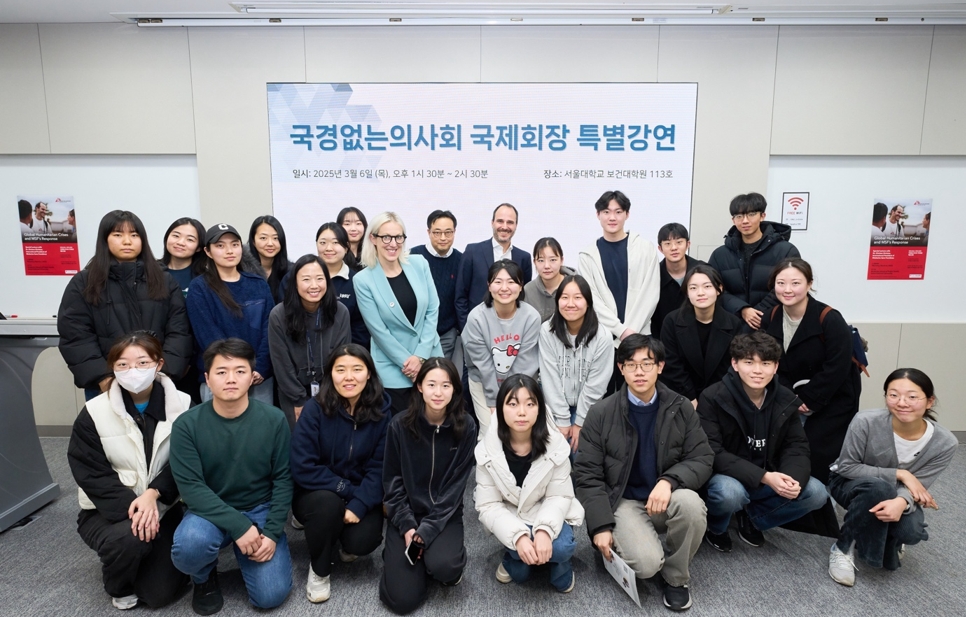
Dr. Christos Christou, International President of MSF, presenting in the special lecture
On March 6, the SNU Graduate School of Public Health (SNU GSPH) invited Dr. Christos Christou, the International President of Médecins San Frontières (MSF) to give a special lecture on humanitarian crises around the world and MSF’s efforts to address them. Titled “Global Humanitarian Crises and MSF’s Response,” the lecture served as a platform for students and researchers at SNU to engage directly with a humanitarian organization at the forefront of assisting populations that face natural and man-made disasters. With the vital role that Public Health research plays in enhancing the scope and effectiveness of humanitarian medical support, SNU GSPH hoped to introduce the real-world impacts that such research can have and help students draw more realistic images of the practices and challenges that can occur on the field when conducting medical humanitarian work.

Poster for the special lecture “Global Humanitarian Crises and MSF’s Response”
Introducing Médecins Sans Frontières, an Organization at the Forefront of Humanitarian Aid
Dr. Christos Christou started his lecture by introducing MSF, detailing its mission, principles of operation, and areas of work. Founded in 1971, MSF is a non-profit, independent, medical humanitarian organization that was established with the mission to aid communities in distress, including victims of natural or man-made disasters and those living in armed conflict zones. Today, a total of 67,000 members help operate MSF projects and over 7 million people around the world support their activities. Dr. Christou’s own journey with MSF began with his small yet passionate desire to be there for the most vulnerable people. Following his participation in projects that supported the migrant community in his home country, Greece, he became involved in a medical project in Sub-Saharan Africa combating the HIV pandemic. His engagements with the patients and the volunteer workers of MSF during his work in the region ultimately drove him to become part of the MSF movement.
The five core working principles of MSF are impartiality, independence, neutrality, speaking out, and transparency & accountability. It is these five values and the volunteers’ strict adherence to them that drive MSF’s operations around the world. Dr. Christou particularly emphasized impartiality and neutrality as pillars that allow MSF to expand its reach to all corners of the world. Engaging in humanitarian work often means that one meets individuals or communities that hold different religious and political values. A worker and volunteer in this field, however, must leave aside these differences and deliver assistance to populations based on the sole fact that we are all human.
Questions on Tackling Diverse Humanitarian Issues—Korea’s Role in Advancing Public Health Research
From search and rescue operations in the Mediterranean Sea to providing basic necessities and medical care in the Gaza Strip, Dr. Christou delineated some of the missions the MSF were presently conducting. In Sudan, MSF teams have been focused on attending to malnutrition cases and running vaccination campaigns. The outbreak of the Sudanese Civil War in 2023 expanded the scope of operations to include surgery and trauma care and maternal health care. The violent conditions of the country have led to security and administrative barriers for MSF’s activities, and Dr. Christou highlighted that part of the challenge of humanitarian work in warring states is communicating with the conflicting parties to secure unimpeded delivery of aid.
The medical problems MSF tackles are not only due to conflict and political turmoil. Explaining MSF’s work in Nigeria, Dr. Christou elaborated how climate change has exacerbated public health and malnutrition issues in the country. The prolonged dry seasons and frequent floodings have not only disrupted the supply chain of agricultural goods, but they have also led diseases such as malaria to become seasonal. In this sense, climate change becomes a key area of concern for humanitarian workers as the nature of the issue means that vulnerable populations are affected the most even though they are the least responsible.

Dr. Christou elaborating on the various missions he was involved in
In the face of these issues, Korea has an important role to play. As a country that is achieving key developments in bio-medical research, Dr. Christou highlighted that creating a supply chain and proper distribution mechanisms for research products is invaluable effort for advancing humanitarian efforts around the world. For example, Korea’s Euvichol-S oral cholera vaccine, which received prequalification from the World Health Organization in April, 2024, can help reduce shortages in vaccine supply with its greater production capabilities. “Today I am speaking to an audience that will become future leaders and can have influence in this field,” he said. Much of the research needed to combat the disease and healthcare issues onsite are often not conducted due to the lack of profit generated. “You do not need to become one of us. But I hope that as researchers you can show solidarity and help give hope to those who need it most.”
A Discussion on Key Topics in Humanitarian Aid Work
Following the end of Dr. Christou’s lecture, the floor was opened for the audience to ask questions. Questions on a variety of topics were asked including inquiries about the specific operations of the MSF, Dr. Christou’s opinions on core issues in healthcare, and advice on working in this field.
One question that resonated with many studying public health issues was by Choi Arhun, a PhD student at the Graduate School of Public Health (SNU GSPH) researching ways to resolve inequality between countries and help those without access to basic necessities. Coming from her own experience of feeling overwhelmed by the complexity of the issues she researches, Choi asked Dr. Christou how he dealt with the emotional burden as a doctor who often works with the most vulnerable populations living under inhumane conditions.
Having courage, the simple yet most arduous action, was Dr. Christou’s answer. “It is tough to operate while bombs are overhead,” Dr. Christou started, a testament to the extreme situations under which he often conducted emergency surgeries. “But we have to carry on. And the thought that our work gives our patients hope gives me the courage to persist.” Dr. Christou stressed that there will be times when courage might not be enough, and moments come when you lose all optimism. In those instances, however, the strength to continue came from his team members. Humanitarian work is not something that can be accomplished alone, and Dr. Christou underscored the importance of understanding the collectiveness of such work in maintaining morale.

A photo of Dr. Christou and the audience of the special lecture
The special lecture with Dr. Christos Christou from MSF was an opportunity for students to learn about the applications and real-life impacts of research in public health. Through sharing his experiences in the field, Dr. Christou brought to the stage discussions on ethical and practical dilemmas one may face in this line of work and the values one must consider when making decisions. With studies in Public Health aiming to contribute to improving the health conditions of the international community as a whole, we hope this session presented insights that will further fuel research at SNU.
Written by Yeryoung Lee, SNU English Editor, yeryounglee@snu.ac.kr

